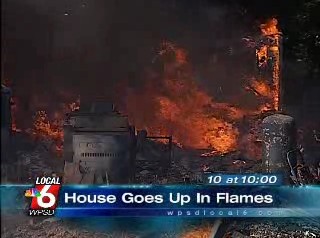
Gene Cranick, of Obion County, Tennessee, got a taste of the future last week when firefighters arrived to his burning home only to stand idly by while it burnt to the ground over the next several hours. Why? Because Cranick had not paid the $75 fee to the city of South Fulton for coverage by their fire department. (news video available)
Cranick knowingly opted to gamble and not spend the $75 up front, only to be told by the fire chief there was nothing the department could do for him, despite his promises on-scene to pay whatever it would cost to have the fire crew save his home.
Did Cranick get what was coming to him? In one sense, yes. And clearly this was a pointed object lesson for other area homeowners who were behind on their fire dues. But this was a tragedy for more than just the man who failed to pay up.
The fire started outside in a burning barrel and consumed a shed almost two hours before setting the Cranick home alight. It could have easily been contained early on. Instead, it was only fought once it had jumped to a neighbors property who had paid the fee. A neighbor whose land would have been untouched by the fire had it been addressed at its origin. Presumably both properties are insured which means that insurance companies are now paying for the neighbor’s damage as well as for a total home loss that never should have been. Those outlays impact the rates of other insured customers. They might conceivably even cause companies to decline to offer fire insurance in Obion County. The specifics of the Cranick case are unknown, but it’s also possible the homeless Cranick family is now destitute, unemployed, or otherwise now in a position where they require additional government or community resources they would have otherwise never needed.
This is exactly why fire departments are traditionally a socialized service. The impact of not having the service available for everyone means that an individual’s actions, inactions, or just bad luck can have an adverse effect on the community as a whole. This was the motivation behind publicly funded (socialized) schools. The societal cost of an uneducated workforce was deemed greater than the cost of getting all kids a high school diploma.
As a country, we have a long history of beneficial socialized programs, but a visceral distaste for calling them that. We even use the term “socialist” as an epithet. The tendency is to view socialist programs as free handouts. And that goes against our national self-image as a group of hard-working individuals who all pulled ourselves up by our own bootstraps. We don’t take things we didn’t earn, and we don’t give things to folks who didn’t earn them. That pride and that work ethic is admirable, and the point is not to suggest that we should start subsidizing people to sit on their couch all day and eat bon-bons.
Rather, we need to view socialized programs as investments, and we need to assure we are getting a return on that investment. There is an upside to all of us in having a town that’s not on fire. Similarly, there is an upside to educated children who are prepared to enter the workforce, a healthy workforce who can stay on the job, incentives for industries to create jobs and build the goods we need, a transportation network to move those goods to consumers, a solvent banking system to base our economy on, and a strong military to keep us safe. These are all, to some degree, socialized programs in the United States today.
It’s time to stop feigning, “We’re America. We don’t do socialism.” We do. Sometimes we do it poorly so as to keep it from looking like a socialist program, but we pay for it just the same. No one is suggesting we become a completely socialist economy. No one. But government has a role to play. There are services we desperately need government to provide. Services that provide the basics all of us depend on. Services that enable the pursuit of the American dream. We need to own up to that need—that dependence. We need to work to have efficient and cost-effective delivery of those services. And we need to be willing to pay for them socially… with our tax dollars. It’s not a government handout when it’s a good investment for all of us.
